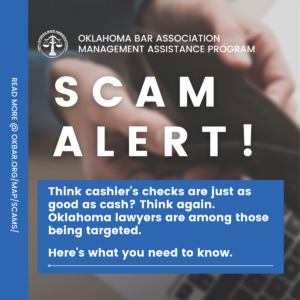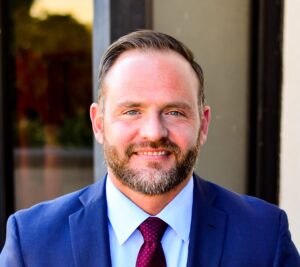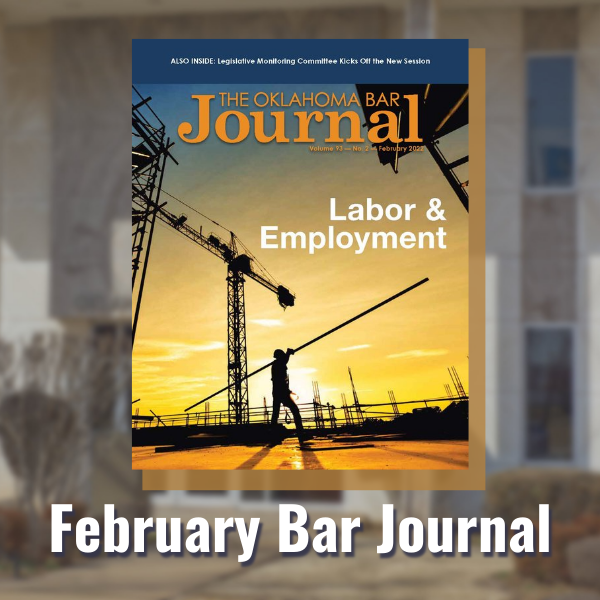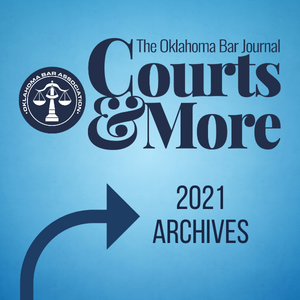Volume 2 No. 6 | February 9, 2022
Courts
No published opinions this week.
No published opinions this week.
The Supreme Court of Oklahoma Court Calendar
The Supreme Court of Oklahoma is in session year round, unless otherwise noted. The Court regularly schedules conferences on Mondays and other days as needed.
More
 You may have been taught in the past that cashier's checks are just as good as cash. That is not the case today because forged cashier’s checks are often indistinguishable from real ones.
You may have been taught in the past that cashier's checks are just as good as cash. That is not the case today because forged cashier’s checks are often indistinguishable from real ones.
Oklahoma lawyers are being targeted – don’t let it happen to you. OBA MAP Director Jim Calloway says it's a new version of an old scam.
Read more>>>
OBA committees are hard at work this year with 2022 leadership in place. Meetings and projects are underway, and some did not even pause during the recent snowstorm, pivoting to online meetings. A quick look at the OBA master calendar shows the breadth of activity that takes place almost daily to improve the association and help all members with information and support.
The Lawyers Helping Lawyers Assistance Program is always in action. Led by Chair Scott Goode and Vice Chair Sheila Naifeh, with a group of dedicated members, LHL has monthly discussion meetings in Oklahoma City and Tulsa and focuses on getting resources to members, including free confidential counseling, mentoring and more.
 For Goode, his service is meaningful. "It wasn’t but about 8 years ago when this program changed my life, and now I get to help guide it into the future and, hopefully, be a part of helping other lawyers out of the emotional holes we can sometimes dig ourselves into."
For Goode, his service is meaningful. "It wasn’t but about 8 years ago when this program changed my life, and now I get to help guide it into the future and, hopefully, be a part of helping other lawyers out of the emotional holes we can sometimes dig ourselves into."
The February Tulsa discussion group is scheduled for Thursday from 5:30 - 6:30 p.m. at Goode's office, 1437 S. Boulder Ave., Ste. 1200.
"If any bar member out there has any ideas that could even possibly help move us in the right direction, please know that my door is always open. Also, if there are other lawyers out there that just need to talk, call or come by anytime.
"Remember, if you are struggling, you are not alone. There are those of us out here that have been where you are and, with the help of others, made it through and are now better off for having gone through those tribulations. All you have to do is call me."

Reminder
The February Oklahoma Bar Journal addresses issues surrounding Labor & Employment. Katherine Mazaheri and Chelsi Chaffin Bonano examine the nuances of “intersectionality” in their co-authored article, "Intersectionality: Understanding a New Subcategory of Discrimination Under Title VII."
The theory of intersectionality, and the term itself, was introduced in 1989 by Professor Kimberlé Crenshaw.1 When Crenshaw first introduced the term, she sought to describe the experience of Black women in discrimination cases.2 Intersectionality theory seeks to “explain and analyze the experience” of intersecting traits.3 Since Crenshaw introduced the term, intersectionality as a whole has continued to evolve and now encompasses many different types of intersectional plaintiffs struggling to prove discrimination cases. This article is presented in two parts.
Read the article. >>>
Featured CLE: The Appeals Series
By Jim Calloway, director, Management Assistance Program
Bill Henderson, is professor of law at Indiana University Maurer School of Law, where he holds the Stephen F. Burns Chair on the Legal Profession. He blogs at Legal Evolution, and his academic focus involves analyzing data about law practice and the legal profession. This blog is mandatory reading for those interested in the future of our profession.
This recent post, "Eight updated graphics on the US legal services market," is an example of the valuable data he shares. Some concerning trends are noted and the theme he draws from this data, that the legal profession appears to be on autopilot, will upset some. Last summer, we offered an OBA CLE program on the challenges facing the people law provider. The data shows receipts from individual clients are declining while business clients are paying more.




 Pay your OBA dues
Pay your OBA dues 





